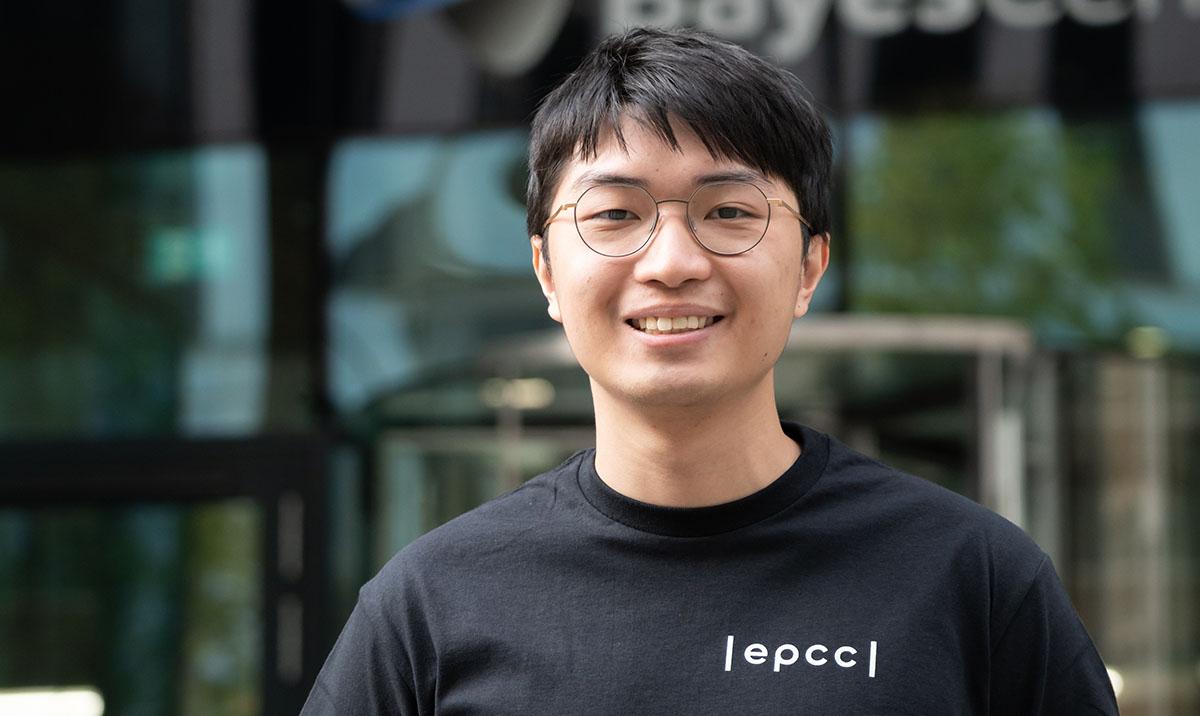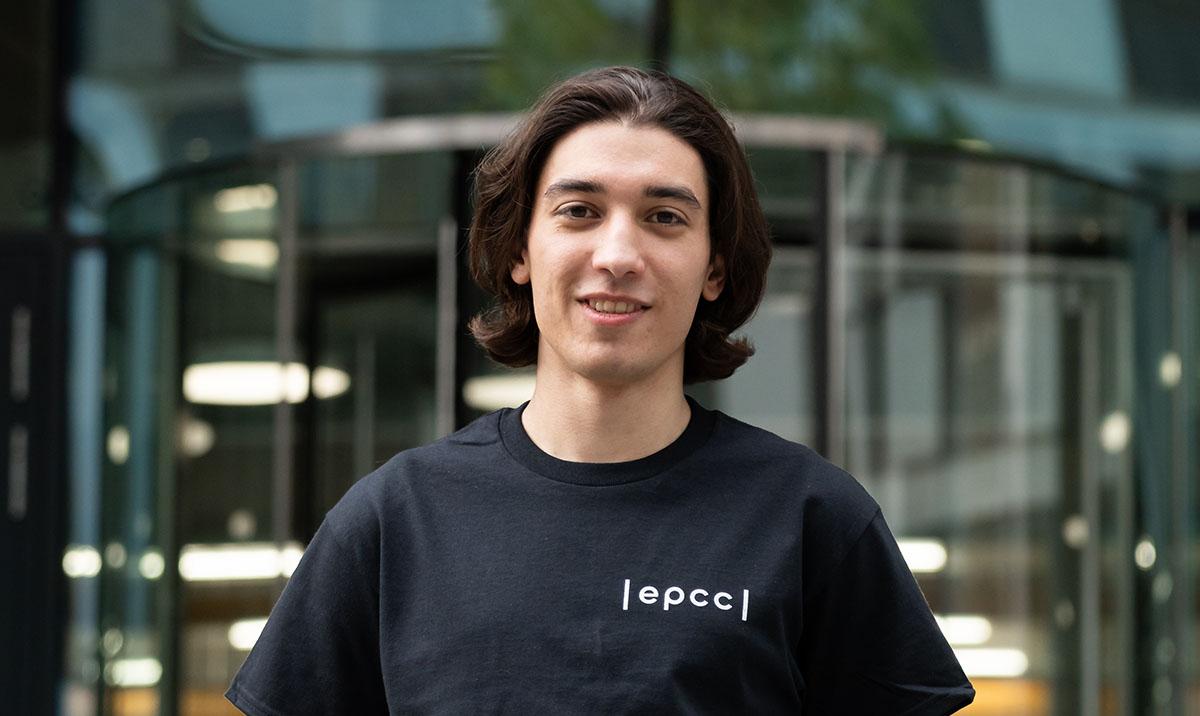ISC25 Student Cluster Competition
26 June 2025
Members of TeamEPCC share their experiences of competing in the Virtual Student Cluster Competition of the ISC High Performance event.
The ISC 2025 Student Cluster Competition (SCC) is a key event in the ISC conference, bringing together 26 student teams from around the world to compete in real-world HPC challenges.
This year, TeamEPCC, comprising three students from EPCC’s MSc in High Performance Computing (HPC) and MSc in HPC with Data Science, competed virtually on the Bridges-2 system at the Pittsburgh Supercomputing Centre (PSC). Benchmarking and optimising selected HPC applications, they drew on the skills they have developed throughout their studies, aiming to achieve the highest performance.
Preparations
As part of TeamEPCC’s preparations, they utilised ARCHER2, hosted at EPCC's Advanced Computing Facility (ACF), to familiarise themselves with their HPC applications. Using the same AMD EPYC 7742 CPUs and a similar software stack to Bridges-2, ARCHER2 provided an ideal platform for our students to build and optimise dependencies, and to analyse the performance characteristics of the codes.
Additionally, to support the team's preparation for GPU workloads, EPCC also provided a dedicated GPU cluster composed of 16 Nvidia H100 GPUs. Using this dedicated system, the team could explore system management. They also explored CPU architecture and compiler optimisations, along with effective management of HPC environments, as part of their preparation for the competition.
Applications
Each student was responsible for a specific application during the competition: SeisSol (Zakariya Oulhadj), Code_Saturne (Leong Fan Fung) and OpenMX (Husnulzaki Haryadi).
-
SeisSol: a flagship earthquake simulator based on the ADER-DG method, simulating rupture processes and wave propagation on unstructured tetrahedral meshes.
-
Code_Saturne: a general-purpose Computational Fluid Dynamics (CFD) solver developed by EDF, capable of simulating incompressible or compressible flows, including turbulence and heat transfer, on unstructured grids.
-
OpenMX: a first-principles computational chemistry package based on density functional theory (DFT), designed for simulations of electronic structures, molecular dynamics, and material properties using pseudo-atomic orbital basis sets.
Competition
Throughout the six-week-long competition, the team worked intensively to benchmark and optimise their assigned HPC applications on Bridges-2. This involved fine-tuning input parameters, experimenting with compiler and runtime configurations, and analysing performance bottlenecks using profiling tools. Each student brought their focus and expertise to bear, ensuring that every application was pushed to achieve the best possible performance.
The competition wasn’t without its challenges! A storm in Pittsburgh caused an unexpected outage of Bridges-2. Undeterred, the team continued their efforts on ARCHER2, using the downtime to further refine performance and explore optimisation strategies for when the system eventually came back online.
What TeamEPCC say

Leong Fan Fung (Stanley)
MSc in High Performance Computing
“ISC25's SCC was my first hands-on experience working with production-level HPC software (Code_Saturne) and it was a valuable introduction to the standards and best practices expected in HPC. I gained a deeper understanding of how large scientific codebases are structured and maintained.
"During the competition, I was drawn towards managing our shared software environment. I took the initiative to build and maintain the core packages our team relied on for prototyping, testing, and benchmarking. This streamlined our workflow and enabled faster iteration for everyone involved.
"Another highlight was learning how to make the most of the hardware we were working with. I spent time understanding the CPU architecture and performance guidelines to fine-tune and maximise performance across applications.
"I’m honoured to have represented EPCC alongside such a dedicated team – I’m extremely proud of our team effort. The experience has strengthened my skillset in extracting performance in HPC software and managing HPC systems. And most importantly – I had great fun!”

Husnulzaki Haryadi
MSc in High Performance Computing with Data Science
“The online competition is as interesting as it is challenging, as it was the first time I've ever had to work with real scientific applications outside of the coursework, let alone one as big and complex as OpenMX.
"Understanding how the software works, including the physics behind it, was a major part of the competition, and it makes me appreciate how subjects that I previously only studied in the classroom, like numerical algorithms and message passing programming, are practically utilised to push the boundaries of science.
"The format of the online competition also feels unique to me. It was like a ‘twisted’ form of hackathon, where instead of tweaking our code to achieve the best result, we tinker with the libraries, compilers, and everything else but the code itself! I've never tried anything like it.
"I think the biggest challenge in this competition did not come from the applications or the system we need to run it on, but from our time management. As the competition schedule overlapped with coursework deadlines and exams, it really put pressure on the team to juggle focus between academic work and the competition itself. It was tough, yet the team was still able to close the book with a refined and thorough result—and for that, I am proud of them :).”

Zakariya Oulhadj
MSc in High Performance Computing
“Taking part in the competition with TeamEPCC has been a standout experience of my MSc studies, giving me first-hand exposure to the practical challenges of porting and tuning HPC codes. It allowed me to apply the theoretical knowledge gained from the MSc, particularly from HPC Architectures and Performance Programming modules, in a real-world competitive environment.
"Working on SeisSol, a complex earthquake simulator, I focused on optimising the Turkey scenario, achieving multi-teraflop performance across four nodes through targeted tuning and system-specific optimisations. This deepened my understanding of how to utilise modern hardware efficiently—an essential skill in HPC, where well-optimised software drives meaningful scientific impact.
"The competition has also strengthened my ambition to pursue a career in performance-oriented software engineering, focusing on fully utilising modern hardware architectures. Ultimately, hardware is only as good as the software that drives it.”
This article was coordinated by TeamEPCC mentors Xu Guo and Spyro Nita.
Links

